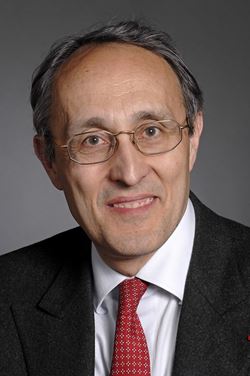
The director general of the ITER Organisation, Bernard Bigot, has died at the age of 72 due to an unspecified illness. Bigot took over as head of ITER in March 2015 and was almost halfway through his second term as ITER boss, which would have ended in 2025. Bigot’s deputy – Eisuke Tada – has taken over leadership of the French-based fusion project while the ITER Council searches for a long-term successor to Bigot.
Born in Blois, France, on 24 January 1950, Bigot studied physical science at the École normale supérieure in Paris and later gained a PhD in chemistry. Following positions at École normale supérieure de Lyon, he became director of the institution in 2000 and then high commissioner for atomic energy in 2003. He took over as chair of France’s Alternative Energies and Atomic Energy Commission in 2009 before succeeding the Japanese physicist Osamu Motojima as ITER boss in 2015.
ITER is an experimental fusion reactor that is currently being built in Cadarache, France. A collaboration between China, Europe, India, Japan, Korea, Russia and the US, the project aims to generate about 500 MW of fusion power over 300 seconds using a plasma heating of 50 MW.

When Bigot joined ITER, the project was in serious difficulty with cost overruns and delays. A management assessment report in 2014 had slammed the ITER Organization for inflexible and top-heavy management, slow decision-making and the failure to foster an effective management culture. Some members, notably the US, expressed scepticism about the project’s viability and whether they should continue to participate.
When Bigot took charge, he sought to change the culture and helped turn the project around, reforming the management system and offering a more realistic budget and schedule. The ITER project, which will cost tens of billions of euros, is now some 75% complete with the facility on track for its “first plasma” in early 2026. However, it will not be until 2035 that the first deuterium-tritium plasma, or “burning fuel”, is performed, which is when ITER can meet its aim of generating more energy than is put into the fusion reaction.
Greatly missed
In comments posted on a memorial website set up by ITER, Tada expressed his “deep sorrow” at the news of Bigot’s death on 14 May. “I am determined to carry on your ambitions and work together with everyone to proceed with the ITER Project,” he adds. “Thank you for your hard work.”
It is deeply sad that [Bigot] won’t be there to see ITER run
Steve Cowley
Steve Cowley, director of the Princeton Plasma Physics Laboratory in the US, told Physics World that Bigot was instrumental in turning ITER’s fortunes around. “Bernard’s extraordinary combination of vision, determination and organizational skill has propelled ITER almost to the point of first operation,” says Cowley. “It is deeply sad that he won’t be there to see ITER run – it is the most important experiment of the first half of the 21st century.” Ignition pending
Condolences have also come in from the leaders of other international projects. “Bigot was an inspiration to all of us working in the field of fusion energy,” says Ian Chapman, chief executive of the UK Atomic Energy Authority, which operates the Culham Centre for Fusion Energy in Oxfordshire, in a statement.
“He transformed the ITER project through his leadership, strength of character and incredible personal commitment. Leading one of the most aspirational but complex endeavours ever undertaken by humanity requires courage, resilience and humility, all of which Bernard displayed unfailingly.”
Bigot has been an outstanding political leader and reliable friend far beyond the ITER project. We will miss him greatly
Sibylle Günter
Francesco Sette, director general of the European Synchrotron Radiation Facility in Grenoble, France, says Bigot was an “inspirational scientist and leader”. “[He was] fully devoted and committed to the advancement of science for the well-being of humanity,” adds Sette, who is also chair of EIROforum – an umbrella organization for eight of Europe’s largest research organizations. “Bigot has been a model for all of us in the scientific community, and for me personally”.
Sibylle Günter, scientific director of the Max Planck Institute for Plasma Physics in Garching, Germany, says that without Bigot’s leadership, the ITER project would not have progressed as far as it has. “We and the whole fusion community owe so much to [Bigot], especially, of course, [his] outstanding leadership of the ITER project. Bigot has been an outstanding political leader and reliable friend far beyond the ITER project. We will miss him greatly.”




